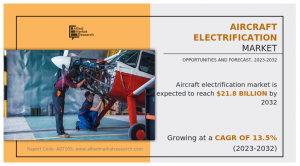
Aircraft Electrification
OREGAON, PORTLAND, UNITED STATES, May 3, 2023 /EINPresswire.com/ — The global aircraft electrification market was valued at $6.2 billion in 2022, and is projected to reach $21.8 billion by 2032, growing at a CAGR of 13.5% from 2023 to 2032.
Aircraft electrification refers to the use of electric power in various systems and components of an aircraft, as opposed to traditional fossil fuel-based technologies. This covers electrically powered systems including air conditioning, hydraulic systems, and other auxiliary systems, as well as electric motors, batteries, power electronics, and distribution systems.
𝐑𝐞𝐪𝐮𝐞𝐬𝐭 𝐑𝐞𝐩𝐨𝐫𝐭 𝐒𝐚𝐦𝐩𝐥𝐞 𝐏𝐃𝐅 : https://www.alliedmarketresearch.com/request-sample/7470
Europe dominated the “global aircraft electrification market” in 2022. The European aviation industry is a large market for airlines and airline component manufacturers. The European countries are aligning their workforce toward designing and creating electric aircraft technologies for the European aviation industry. France is expected to hold a dominant revenue share throughout the forecast period owing to growing aviation start-up companies and the introduction of electrification in aircraft in the country. For instance, in December 2021, French aviation start-up Ascendance Flight Technologies launched the design of the Atea, a five-seater vertical take-off and landing (VTOL) aircraft, maximum take-off weights is between 450kg and 2,200kg, and projected flight ranges from 16km to 300km.
There is a growing demand for aircraft electrification due to the need for more efficient and environmentally friendly aircraft, the demand for lower operating costs, and advancements in electric propulsion and energy storage technologies. Aircraft electrification is the need to reduce the environmental impact of aviation. Electric propulsion systems produce fewer emissions than traditional fossil fuel-based systems, making them a more environmentally friendly option. For instance, in 2020, Airbus revealed three concepts for hydrogen-powered aircraft that could enter service by 2035. These planes would offer a more sustainable and efficient solution for the aviation industry.
Moreover, advancements in electric propulsion and energy storage technologies are driving the adoption of electrification in aircraft. The development of more efficient and powerful electric motors, as well as high-capacity batteries, is making it possible to design and operate aircraft with greater range and performance.
𝐏𝐫𝐨𝐜𝐮𝐫𝐞 𝐂𝐨𝐦𝐩𝐥𝐞𝐭𝐞 𝐑𝐞𝐬𝐞𝐚𝐫𝐜𝐡 𝐑𝐞𝐩𝐨𝐫𝐭 𝐍𝐨𝐰 : https://www.alliedmarketresearch.com/aircraft-electrification-market/purchase-options
On the basis of technology, the global aircraft electrification market has been segmented into more electric, hybrid electric, and fully electric. Hybrid electric is a combination of electric and traditional combustion engines to power aircraft. In a hybrid electric aircraft, an electric motor is used to supplement the traditional gas turbine engine. Hybrid electric technology can help to achieve this goal by reducing fuel consumption and emissions. Airbus is in the development of hybrid electric aircraft technology. The company has developed a prototype hybrid electric aircraft called the E-Fan X, which is designed to be used for regional flights.
𝐊𝐄𝐘 𝐅𝐈𝐍𝐃𝐈𝐍𝐆𝐒 𝐎𝐅 𝐓𝐇𝐄 𝐒𝐓𝐔𝐃𝐘
By component, the Fuel Cells segment is anticipated to exhibit significant growth in the near future.
By application, the Energy Storage segment is anticipated to exhibit significant growth in the near future.
By technology, the Fully Electric segment is anticipated to exhibit significant growth in the near future.
By region, Asia-Pacific is anticipated to register the highest CAGR during the forecast period.
𝐈𝐧𝐪𝐮𝐢𝐫𝐞 𝐁𝐞𝐟𝐨𝐫𝐞 𝐁𝐮𝐲𝐢𝐧𝐠 : https://www.alliedmarketresearch.com/purchase-enquiry/7470
Key players operating in the global aircraft electrification market are Ametek, Astronics Corporation, BAE Systems plc., Honeywell International Inc., Magnix, Meggitt PLC, Collins Aerospace, Rolls Royce Plc, Safran, and Thales Group.
David Correa
Allied Analytics LLP
+1 800-792-5285
email us here
![]()






































